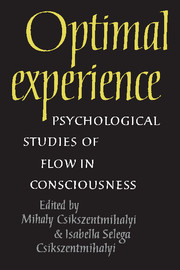Book contents
- Frontmatter
- Contents
- Acknowledgments
- Contributors
- I A THEORETICAL MODEL OF OPTIMAL EXPERIENCE
- II VARIETIES OF THE FLOW EXPERIENCE
- III FLOW AS A WAY OF LIFE
- 11 Introduction to Part III
- 12 Modernization and the changing contexts of flow in work and leisure
- 13 Ocean cruising
- 14 Flow in a historical context: the case of the Jesuits
- IV THE MEASUREMENT OF FLOW IN EVERYDAY LIFE
- References
- Name index
- Subject index
13 - Ocean cruising
Published online by Cambridge University Press: 05 June 2012
- Frontmatter
- Contents
- Acknowledgments
- Contributors
- I A THEORETICAL MODEL OF OPTIMAL EXPERIENCE
- II VARIETIES OF THE FLOW EXPERIENCE
- III FLOW AS A WAY OF LIFE
- 11 Introduction to Part III
- 12 Modernization and the changing contexts of flow in work and leisure
- 13 Ocean cruising
- 14 Flow in a historical context: the case of the Jesuits
- IV THE MEASUREMENT OF FLOW IN EVERYDAY LIFE
- References
- Name index
- Subject index
Summary
Ocean cruising is an example of one of the more exotic and esoteric ways of living when viewed from the perspective of Western industrialized society. Cruisers are people who sail the oceans for years at a time, and do so for pleasure rather than profit. They forsake the security and safety of land-based life for the formidable challenges of ocean and weather. Many of them give up “successful” careers, and all must overcome the work ethic as they move their productive activities from the center of their lives to its periphery. In making this choice they deviate from the usual goals that society suggests people seek, and so imply that they are dissatisfied with mainstream society. Cruisers challenge societal values by altering their whole way of life, abandoning their careers, income, social mobility, the community, and the security of a fixed family life.
The flow model can be used to explain why cruisers are motivated to pursue the lifestyle of this subculture. Clearly, this way of life must be intrinsically motivating, since it requires much effort, involves considerable danger, and provides no extrinsic rewards such as fame or money. Previous studies of intrinsic motivation have focused on autotelic activities like chess or mountain climbing (Csikszentmihalyi 1975b). The present study extends the concept to an autotelic lifestyle, one that represents an attempt to restructure everyday life activities into a continuous flow experience.
- Type
- Chapter
- Information
- Optimal ExperiencePsychological Studies of Flow in Consciousness, pp. 214 - 231Publisher: Cambridge University PressPrint publication year: 1988
- 9
- Cited by



